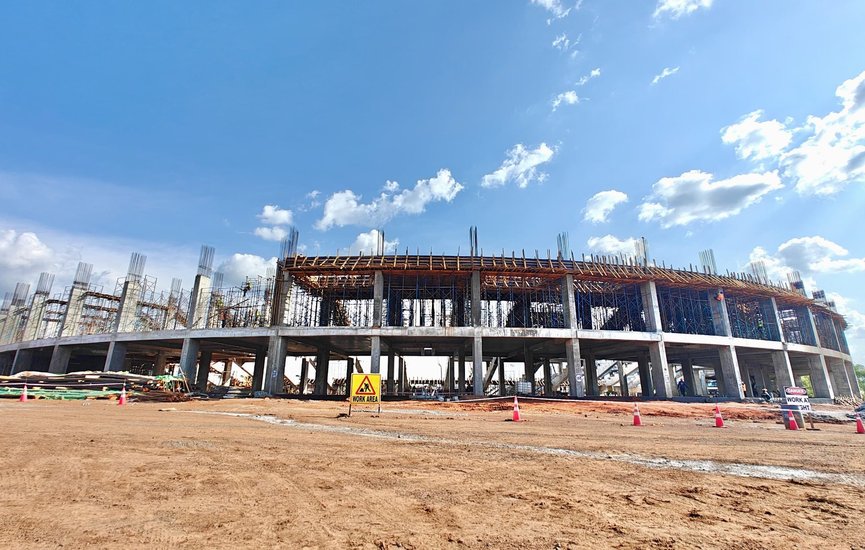A new chapter is unfolding in northern Uganda as the construction of Akii Bua Stadium, a 20,000-seat state-of-the-art facility in Lira City, begins to take shape. Once completed, the stadium will be a central part of the region’s economic, social, and infrastructural transformation, ushering in a new era of growth and opportunity for the Lango sub-region.
Named after Uganda’s first Olympic gold medalist, John Akii Bua, the stadium represents more than just a tribute to a sporting legend — it is a bold statement of Lango’s revitalization. Local leaders and stakeholders see the stadium as a turning point, one that will revitalize Lango’s economy, inspire its youth, and elevate Lira into a regional hub for sports, tourism, and business.
Lira City Mayor Sam Atul emphasized that the stadium embodies the spirit of determination, excellence, and resilience — qualities that defined Akii Bua and continue to resonate in the people of Lango. “This is not just infrastructure. It’s a symbol of who we are — a region of achievers. Akii Bua was our son, and this stadium honors his legacy, bringing lasting value to our people,” Mayor Atul said during a visit to the site.
He also pointed out that the stadium is being built in a city that has long contributed to Uganda’s national sports scene. The success of local talents like Allan Okello, a standout player for Cranes and Vipers SC, underscores the region’s potential. “We’ve always had talent — in football, athletics, and more. What we lacked were facilities to match that potential. Now, with this stadium, we’re laying the groundwork for a stronger, more competitive sporting future.”
Economic Impact and Local Empowerment
The construction of the stadium is already making a positive impact on the local economy, driving job creation and local procurement. Over 950 workers are on-site, with more than 90% of them hailing from Lira. Mohamed Nazir, Project Manager for Samco Construction, shared that 30% of the project is already complete, and while the project is scheduled for completion in January 2027, they are ahead of schedule and expect to finish by October 2026.
“This is a locally driven project. The granite, sand, and cement are all sourced from Uganda, much of it from right here in the region,” Nazir said. This approach is keeping money circulating within local communities, empowering small suppliers and contractors, and contributing to the reduction of unemployment and boosting household incomes in Lira and its surrounding areas.
The Resident City Commissioner, Lawrence Egole, highlighted that the stadium project is part of broader development efforts under the NRM government’s agenda to address regional inequalities and unlock northern Uganda’s economic potential. “This is no longer the Lira of the past. We are now connected by good roads to Kampala, Gulu, Soroti, and beyond. Our referral hospital is upgraded. Businesses are thriving. We are among the top five revenue-generating cities in the country,” said Egole. He sees the Akii Bua Stadium as a key driver of Lira’s transformation into a modern, competitive city that can attract investment, host large events, and offer new opportunities for its youth.
A Magnet for Tourism, Hospitality, and Business
Both Mayor Atul and RCC Egole agree that the stadium will serve as a magnet for tourism, hospitality, and entrepreneurship. Investors in hotels, restaurants, and retail are already preparing for the increased demand from visitors, athletes, and sports fans.
“Once completed, the stadium will host major national and regional events. That means more people coming to Lira, staying in our hotels, eating our food, and shopping in our markets,” Mayor Atul said. “It’s a full ecosystem of economic opportunity that’s forming around this one facility.”
Additionally, the construction will improve infrastructure in the city, including the tarmacking of 87 kilometers of road from the stadium to Gulu Airport and the beautification of other roads around the stadium area.
A Bright Future for Sports and Talent Development
The recent victory of the Lango football team in the FUFA Drum tournament is just one example of the region’s athletic potential. Local leaders believe that with the proper facilities, training grounds, professional support, and exposure, many more success stories will emerge.
“We’ve been winning with minimal resources. Imagine what we can achieve with a world-class stadium,” Mayor Atul remarked. “This facility will help us identify, nurture, and grow the next generation of sports stars — not just for Uganda, but for the world.”
From job creation and infrastructure upgrades to sports development and business growth, Akii Bua Stadium is becoming the heartbeat of Lango’s transformation. As construction progresses and the stadium takes shape, so too does the hope and ambition of the region.
